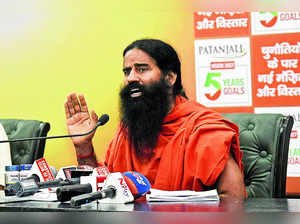
The yoga guru claimed that people are spreading rumours about the brand because Patanjali is not just a product but has become an ideology for millions of its consumers.
There’s also a narrative against its research and development set up, which is bigger and better than Hindustan Unilever Ltd, the country’s largest consumer goods maker, or even the government’s ayurvedic facility, he claimed.
“People try to damage the reputation of Patanjali, about ayurveda and natural products,” Ramdev said. “But we are focused on our objectives of adding investor value, ramping up distribution and sales, research, innovation and ecommerce. Premiumisation will also be a core focus area for us now.”
The ayurveda products maker – which had forced global and local players including HUL, L’Oréal, Colgate Palmolive and Dabur to step up their own ayurveda portfolios about a decade back with its phenomenal growth and popularity – has been facing several challenges including tough competition from both global and local players, regulatory compliance issues, and criticism over its product quality claims among others.
The company has also been trying to shed its image as an organisation led by the Baba and his close aides in Haridwar by bringing in professionals to manage key roles.
For the full year 2023-24, Patanjali reported total revenue of Rs 31,721.35 crore from its operations, with sales from the food and FMCG business contributing to Rs 9,643.32 crore. The contribution share of revenues by the food and FMCG segment to the total revenue from operations rose to 30.06% in FY24 from 19.49% in FY23.
“Despite all hurdles and struggles, we have reached where we are. We didn’t reach here because of any favours... We are here because of India’s consumers,” Ramdev said.
On the listed Patanjali Foods Ltd announcing the acquisition of group firm Patanjali Ayurved Ltd’s home and personal care business for Rs 1,100 crore on Monday, he said: “We have to make the company bigger; and help our investors, associates and retailer partners grow. There are a lot of synergies, cost savings and efficiencies to be drawn from the acquisition.”
The transaction includes all assets and liabilities related to the home and personal care business, as well as employees, distribution networks, contracts, licences, permits, consents and approvals essential for its operation, which will be acquired by the listed company.
Patanjali Ayurved owned 32.4% stake in Patanjali Foods as of March 31, 2024. The home and personal care business of Patanjali Ayurved currently operates in four key segments—dental care, skin care, home care and hair care.
In addition, a 20-year licensing arrangement for a 3% turnover-based fee along with other conditions has been agreed between the two entities.
Patanjali Foods’ portfolio includes edible oils under the acquired Ruchi Soya franchise, biscuits, cookies, breakfast cereals and noodles. The non-foods business includes toothpaste, shampoo, and soaps.
Refuting that Patanjali's market share and brand image have diminished over the past two years amid scrutiny on quality and heightened competition, the company’s chief executive Sanjeev Asthana said Patanjali has two-thirds share within herbal toothpastes, is the country's fourth largest biscuits player having achieved Rs 1,600-crore in sales last year, and has a dominant share in herbal skincare and homecare. “We have 10 brands that have leadership level in business,” he said.
At an overall level, the company’s packaged consumer business has been growing 15-20%, while revenues doubled over the past 3.5 years to Rs 31,000 crore, Asthana said. “Our growth rate has been scorching, whether it’s market share or distribution.”
In 2019, Patanjali Ayurved acquired Ruchi Soya for Rs 4,350 crore through an insolvency process, and later renamed Ruchi Soya as renamed Patanjali Foods Ltd, with a combined product portfolio of biscuits, honey, wheat flour and Nutrela soya chunks. Last year, Florida-based investment management firm GQG Partners picked up 5.96% stake in Patanjali Foods for around Rs 2,400 crore.
Asked about the Supreme Court order directing Patanjali to take down all misleading ad claims some months back, Ramdev said: “The Supreme Court matter was not about quality and neither about doing any wrongdoing... The matter is settled now.”
Last year in November, the apex court had told the company to stop all misleading ads and warned that any false or misleading claims by it could lead to a penalty of Rs 1 crore for every such claim, following a petition filed by the Indian Medical Association.
(Catch all the Business News, Breaking News, Budget 2024 Events and Latest News Updates on The Economic Times.)
Subscribe to The Economic Times Prime and read the ET ePaper online.
Read More News on
(Catch all the Business News, Breaking News, Budget 2024 Events and Latest News Updates on The Economic Times.)
Subscribe to The Economic Times Prime and read the ET ePaper online.









 Get Unlimited Access to The Economic Times
Get Unlimited Access to The Economic Times
